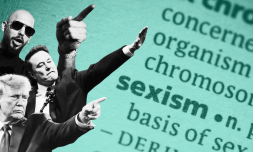Meat, masculinity, and meagre waistlines are all on the rise – and the manosphere might be partly to blame.
It’s not just you. There’s definitely something in the air at the moment. Some might say it started with Pretty Little Thing’s controversial rebrand, in which the fast-fashion giant killed their ‘BBL party wear’ and produced a swathe of light-skinned, waifish models in its place. Others will tell you this was the outcome of a long-awaited industry shift – one that kicked off with Ozempic and has snowballed ever since.
Whether it’s the clothes we put on our bodies or the food we shovel into them, everything surrounding our physicality is moving in a distinctly conservative direction. Meat is on the rise, as carnivorous foods replace veganism as the diet du jour. Fashion trends are favouring the slimmest figures –see: skinny jeans and low-rise capris. Across the board, diversity is flailing, as brands scale back DEI initiatives or abandon them all together.
You might be wondering what any of this has to do with conservative politics. The reality is that fashion and wellness – both billion-dollar industries in their own right – serve as reflections of their time, and thus are powerful vehicles for challenging or enabling the dominant culture.
The resurgence of thinness is a reflection of our regressive gaze. We’re back to pedaling the slimline sentiments of the early 00s, and undoing any incremental progress toward inclusivity as a result. ‘The accessibility of life-changing weight loss drugs like Ozempic and a rise of hyper-feminine conservative imagery have been working in tandem to create what feels like a dangerous skinny resurgence’ writes Impact.
You need only look at SS25’s runways for the hard evidence. Across New York, London, Paris and Milan, this season has boasted a worrying number of extremely thin models. Vogue’s annual size inclusivity report notes a pendulum swing back to glamorised thinness amid the Ozempic boom, as body positivity loses steam in mainstream culture.
Is Gen Z ditching the gym for Ozempic? #genz #ozempic @lauraingle pic.twitter.com/BkaDtZbJ59
— Saju Mathew MD MPH (@drsajumathew) January 2, 2025
As is the nature of the industry, the same trends decorating high-fashion catwalks are infiltrating our daily lives at speed. ‘One doom-scroll down your FYP and it’s hard not to see how every major fashion, lifestyle, and culture trend has connections to reemerging supremacy of thinness,’ writes digital culture reporter Michelle Santigao Cortés.
It’s a silent takeover that reflects a broader movement toward facism and the far-right. Conservative ideology are rooted in strategically limiting ideals of beauty (as it pertains to women) and health (when it comes to men).
‘White nationalist and identitarian movements have strategically used women in their public-facing campaigns to make their ideas seem less dangerous and more legitimate’ says Julia Ebner, author of Going Mainstream: How Extremists are Taking Over.




















